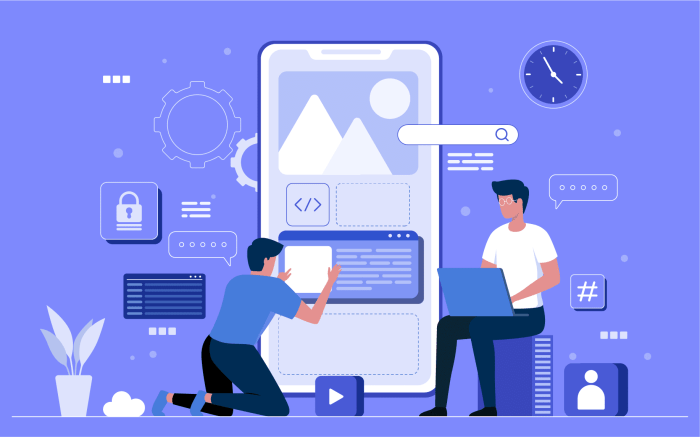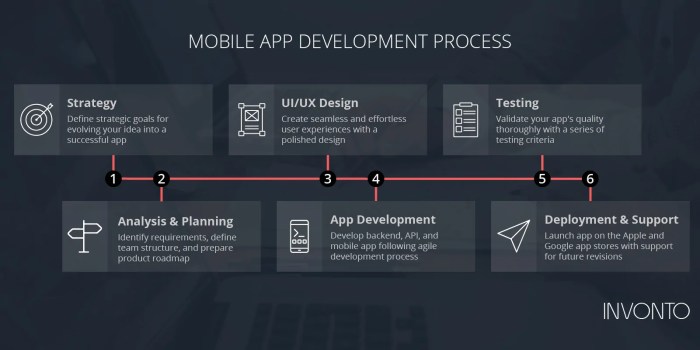
Step into the exciting world of Mobile app development programming where coding is the key to unlocking endless possibilities. From exploring different programming languages to diving into frameworks, get ready for a thrilling adventure in app creation!
Discover the ins and outs of native app development versus cross-platform development, and unravel the mysteries behind integrating APIs. Brace yourself for a journey filled with creativity and innovation!
Mobile app development programming

Programming languages play a crucial role in mobile app development, as they determine how the app will function and interact with users. The choice of programming language can impact the performance, scalability, and overall user experience of the app.
The importance of programming languages in mobile app development
Programming languages such as Java, Swift, and Kotlin are commonly used in mobile app development. Each language has its strengths and weaknesses, making it important to choose the right one based on the requirements of the app. For example, Java is widely used for Android app development, while Swift is preferred for iOS app development due to its speed and performance.
- Java: Known for its versatility and compatibility with various platforms.
- Swift: Offers high performance and is easy to read and write.
- Kotlin: Interoperable with Java and provides enhanced safety features.
Choosing the right programming language can significantly impact the success of a mobile app.
The role of frameworks in mobile app programming
Frameworks are essential tools that provide developers with pre-built components and functionalities to streamline the app development process. They help in reducing development time, improving code quality, and enhancing the app’s performance.
- React Native: Allows developers to build cross-platform apps using JavaScript and a single codebase.
- Flutter: A popular framework by Google for building natively compiled apps for mobile, web, and desktop.
- Xamarin: Enables developers to create cross-platform apps using C# and .NET.
Frameworks simplify app development by providing ready-to-use components and tools for developers.
Native vs. Cross-platform development
Native app development involves building apps for specific platforms, such as Android or iOS, using platform-specific languages and tools. Cross-platform development, on the other hand, allows developers to create apps that can run on multiple platforms using a single codebase.
- Native Development:
- + Better performance and user experience.
- – Higher development costs and longer time to market.
- Cross-platform Development:
- + Cost-effective and faster development process.
- – Potential performance and compatibility issues.
The choice between native and cross-platform development depends on factors such as budget, timeline, and app requirements.
Integrating APIs in mobile app programming
APIs (Application Programming Interfaces) allow apps to communicate with external services and access functionalities that are not built-in. Integrating APIs in mobile app programming enables developers to add features like social media login, payment gateways, and location services to enhance the app’s functionality.
- RESTful APIs: Commonly used for exchanging data between the app and server.
- Third-party APIs: Provide access to services like Google Maps, Facebook, and Twitter.
- Authentication APIs: Enable secure user authentication and authorization.
Integrating APIs in mobile app development expands the app’s capabilities and improves user experience.
Computers programming

Programming lies at the heart of computer technology, enabling the creation of software, applications, and systems that power our digital world. It involves the writing, testing, and maintaining of instructions that computers follow to perform specific tasks.
Significance of Algorithms in Computer Programming
Algorithms are step-by-step procedures or formulas used to solve problems or perform tasks. They are crucial in computer programming as they provide a clear set of instructions to achieve a desired outcome efficiently. Without well-designed algorithms, software and applications would not be able to function effectively.
Difference between Front-end and Back-end Programming
Front-end programming focuses on the user interface and user experience of a software application. It deals with the design, layout, and interactions that users see and interact with. On the other hand, back-end programming involves the server-side logic and database interactions that occur behind the scenes to make the front-end functionalities work seamlessly. Both front-end and back-end programming are essential for the overall functionality of an application.
Object-Oriented Programming and Its Applications
Object-oriented programming (OOP) is a programming paradigm based on the concept of “objects,” which can contain data in the form of fields (attributes or properties) and code in the form of procedures (methods). OOP allows for the modular design of software applications, making them easier to manage, maintain, and scale. It promotes reusability, flexibility, and efficiency in coding. OOP is widely used in software development for applications ranging from web development to game development.
Examples of Popular Programming Languages
- Java: Known for its platform independence and versatility, Java is widely used in web and mobile application development.
- Python: Loved for its simplicity and readability, Python is used in web development, data science, machine learning, and automation.
- JavaScript: Essential for front-end web development, JavaScript brings interactivity and dynamic content to websites and web applications.
- C++: A powerful language used in system programming, game development, and high-performance applications.
- C#: Developed by Microsoft, C# is commonly used in building Windows applications, web services, and games.
Closing Notes
In conclusion, Mobile app development programming opens doors to a realm where imagination meets technology. With a blend of coding expertise and creativity, the sky’s the limit in shaping the future of mobile apps. Dive in, explore, and create the next big thing in the app world!
Clarifying Questions
Why is choosing the right programming language crucial for mobile app development?
Choosing the right programming language ensures optimal performance, compatibility, and scalability for your mobile app.
What are the advantages of cross-platform development over native app development?
Cross-platform development offers cost-effectiveness, faster deployment, and wider reach compared to native app development.
How do frameworks simplify the mobile app programming process?
Frameworks provide pre-built components and tools that streamline development, saving time and effort for developers.